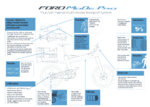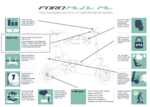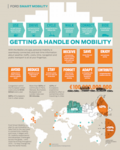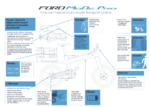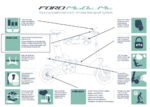Mike leroy
Active Member
Ford created a low-cost, international standard eBike. The single most important step towards an international standard is overcoming the legal obstacle of motor power rating. Ford choose an elegant solution to circumvent the silly and naive "watts" motor power rating used by politicians. Ford choose a 200 watt power rating, which masks the motor's true physical power.To achieve the same speed or hill-climbing ability as conventional eBikes rated in "watts",
Ford choose smaller wheels -- to exploit so-called mechanical advantage. Acceleration or instantaneous bursts of power are not compromised because voltage is raised from conventional 36 to 48 volts. The measure of acceleration for eBikes is from zero to twenty mph in a matter of a seconds. My guess is Ford targets 0-20mph in 8-12 seconds. The eBike will excite riders with thrilling acceleration, without running afoul of international laws.
The significance of an international standard is profound. Incredible economies of scale can be achieved with an international standard. Ford eBikes can realistically sell over ten million eBikes annually for under $500 -- five billion dollars in annual sales. The Ford Model T -- déjà vu, all over again!
Suppose you carpool to work with your husband or a friend. The payoff for an inexpensive, folding eBike is great. The payoff for a grocery shopping or recreational eBike is a very difficult case to justify based on economics. Frequent use is the key to cost savings.
Ford addressed an important issue stalling eBike sales. A friend traded in his eBike for a $4000 Honda PCX150 scooter. His eBike was disappointing for 5-1o mile trips. The 10-20% hill grades are poorly suited to eBikes. Do you remember the George Jetson cartoons of a folding flying saucer? The Ford eBike is like the Jetson flying pods that eject passengers to their final destination.
The most unique feature is ultrasonic, rear-facing sensors to detect traffic. The handle bar lights flash to alert car drivers as they pass bicycles. Like car airbags, ultrasonic technology is a safety feature that should be standard on all bicycles.
Ford's MoDe eBike initiative integrates folding electric bicycles into all Ford vehicles. The integration is both physical and software based. Two eBikes target different customers. Commercial needs are services via the MoDe: Pro eBike. The MoDe:Me targets consumers. Set aside any preconceived notions of "toy" bikes. These folding bikes are high tech and approximate a natural pedaling experience.
Euro jargon like "Pedelec", "S-Pedelec" or "R-Pedelec" is inappropriate in the ultra compact world. Try to prevent pedelec concepts from biasing your perception or frame of reference.
Both eBikes recharge inside the vehicle, facilitating endless short bike trips on inexpensive, durable equipment. The bike design exploits minimum capacity to reduce costs. However, the electrical system is super-charged 48 Volts for best acceleration and power. At 200W, the motor only draws 5 amps. If 350W, 36V, 10 amp European motors are elevators, then the Ford motor is an escalator. The tiny 5A motor compacts well, is very inexpensive and thrives in stop-and-go traffic, rather than blasting the autobahn. The small wheels will spin very quickly.
The battery chemistry is unclear at this time. My guess is battery cost will be surprisingly low, based on the high voltage, low amperage motor.
The MoDe:Link software app brings car-level navigation software to the bicycle. The car and bike are connected via cellphones.
(Link Removed - No Longer Exists)
The MoDe: Pro is the eBike best suited for commercial applications.
The MoDe:Me is the eBike best suited for consumer applications.
A public bus rack may be one solution to the 5-10 mile and steep hill eBike shortcoming. I prefer to drive my car, rather than taking a public bus. Maybe a car/folding bike is a better long range solution than a 100+mpg scooter.
Let's compare and contrast the personal and business versions of the Ford MoDe initiative. Will the Mode:Me be more popular with consumers than the MoDe: Pro with business? Businesses, services and consumers exchange information via the Ford MoDe:Link cellphone app.
http://www.techtimes.com/articles/3...d-reveals-mode-pro-electric-bike-concepts.htm“It is about keeping your independence,” Southey said. “[With bicycling] you can go where you want, when you want.” In addition to the Pro and Me e-bikes, Ford also introduced techies to a sensor kit called Info Cycle, which is an open-source hardware and software kit that can be installed on regular and electronic bikes to gather information about how people use bikes in cities.
By utilizing user data such as bike lane locations, miles ridden, and even the amount of luminosity in particular areas, Ford’s conceptuals involving bike riding aim to improve the commutes of everyone on the road.
Erica Klampfl, Ford's head of mobility, attempted to answer the question of how popular e-biking can actually be. "It's really just about experimenting right now," Klampfl said. "[We want] to take risks and come up with new ideas."
- Big Data Drive: Dearborn, Michigan
- Fleet Insights: United States
- Data Driven Insurance: London
- Remote Repositioning: Atlanta
- City Driving On-Demand: London
- Dynamic Social Shuttle: New York, London
- Car Swap: Dearborn, Michigan
- Ford Carsharing: Germany
- Share-Car: Bangalore, India
- Rapid Recharge & Share: Dearborn, Michigan
- Data Driven Healthcare: The Gambia, West Africa
- Parking Spotter: Atlanta
- Info Cycle: Palo Alto, California
- Painless Parking: London
Attachments
Last edited:
